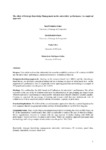The effect of Strategic Knowledge Management on the universities’ performance: An empirical approach

Use este enlace para citar
http://hdl.handle.net/2183/30699
A non ser que se indique outra cousa, a licenza do ítem descríbese como Atribución-NoComercial-SinDerivadas 4.0
Coleccións
- Investigación (FEE) [899]
Metadatos
Mostrar o rexistro completo do ítemTítulo
The effect of Strategic Knowledge Management on the universities’ performance: An empirical approachData
2018Cita bibliográfica
Fernández-López, S., Rodeiro-Pazos, D., Calvo, N. and Rodríguez-Gulías, M.J. (2018), "The effect of strategic knowledge management on the universities’ performance: an empirical approach", Journal of Knowledge Management, Vol. 22 No. 3, pp. 567-586. https://doi.org/10.1108/JKM-08-2017-0376
Resumo
[Abstract]: Purpose. This article explores the relationship between the availability and use of IT solutions for SKM
and the universities´ performance, measured in terms of scientific production.
Design/methodology/approach. Drawing on the resource-based view (RBV) and the Knowledgebased theory, we develop a conceptual framework for exploring the effect of SKM based on IT on the
organization’s performance that we empirically test by applying panel data methodology to a sample of
70 Spanish universities over the period 2011-2014.
Findings. We confirm that the SKM based on IT influences the university’s performance. This effect
is positive in the case of the IT solutions referred to the infrastructure of data grouping and more evident
when the university’s performance is measured by indicators more directly related to scientific quality.
Contrary to expected, the percentage of training and research staff that uses institutional tools of
collaborative work is negatively related with the universities´ capacity of publication.
Practical implications. We followed the system dynamics approach to identify a causal diagram and a
flow sequence that lets us group universities in three different profiles in the KM flow diagram.
Originality/value: First, we develop a conceptual framework for exploring the effect of SKM based on
IT on the organization’s performance that could be applicable to analyse the case of other knowledgedriven organizations. Second, in contrast with the large number of studies dealing with SKM and
performance focused on firms, we analyse universities. Third, our empirical approach used panel data
methodology with a large sample of universities over the period 2011-2014.
Palabras chave
Strategic knowledge management
University performance
IT solutions
Panel data
Dynamic simulation
Resource based view
University performance
IT solutions
Panel data
Dynamic simulation
Resource based view
Versión do editor
Dereitos
Atribución-NoComercial-SinDerivadas 4.0
ISSN
1367-3270






